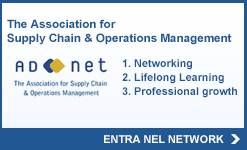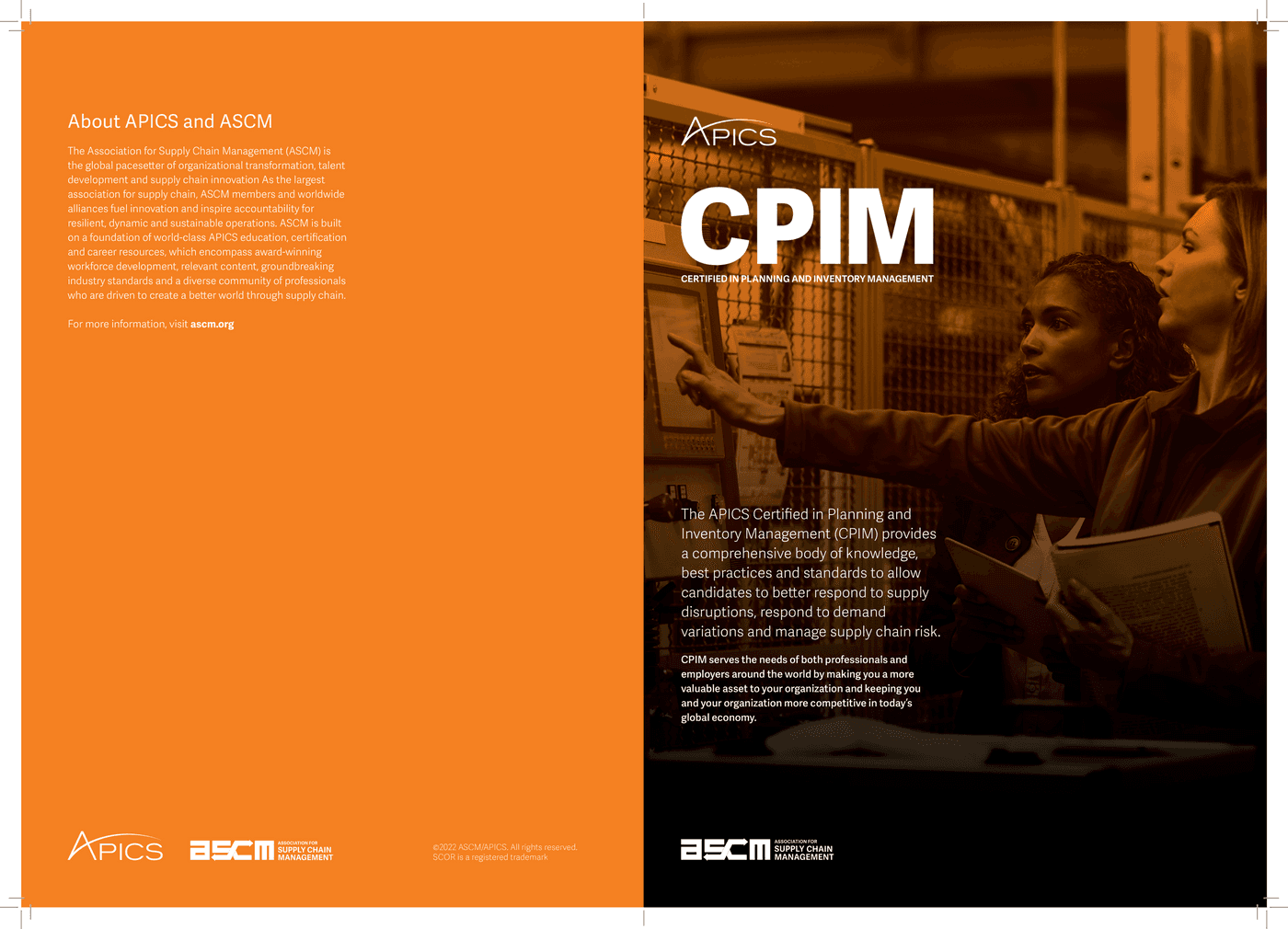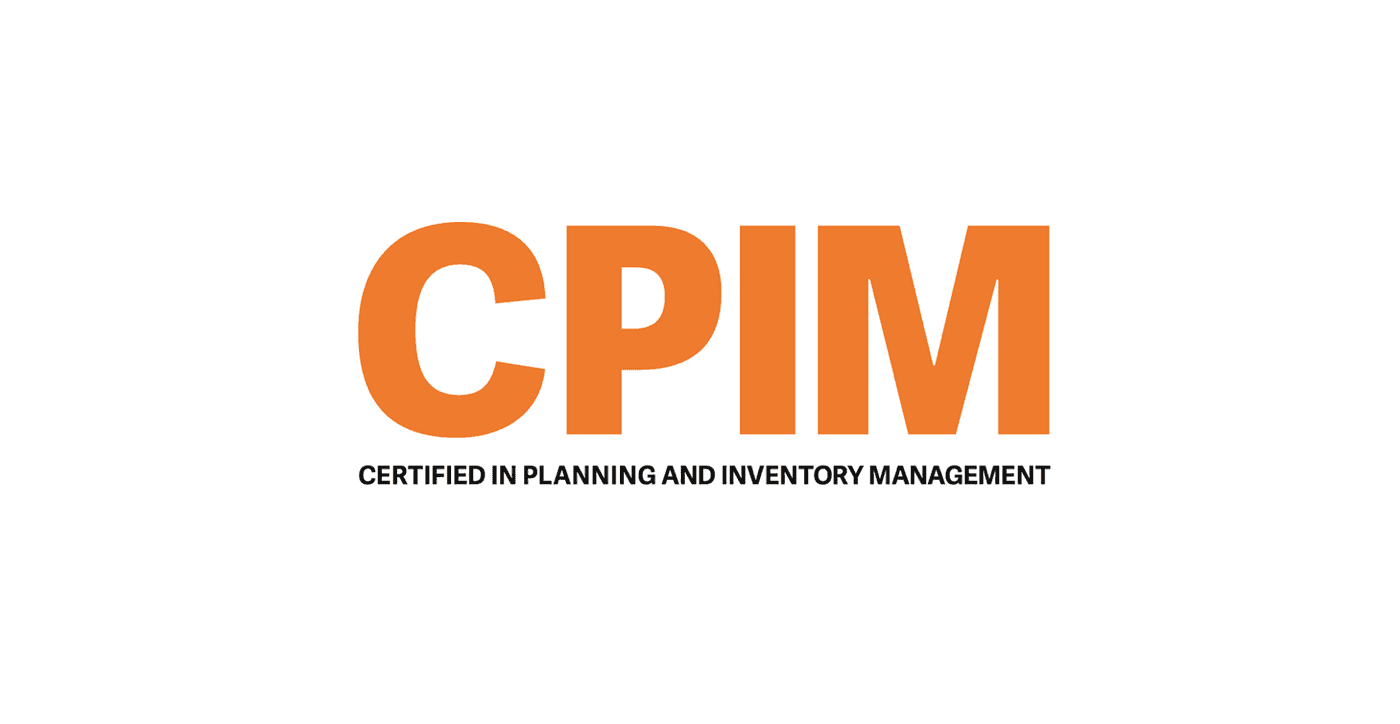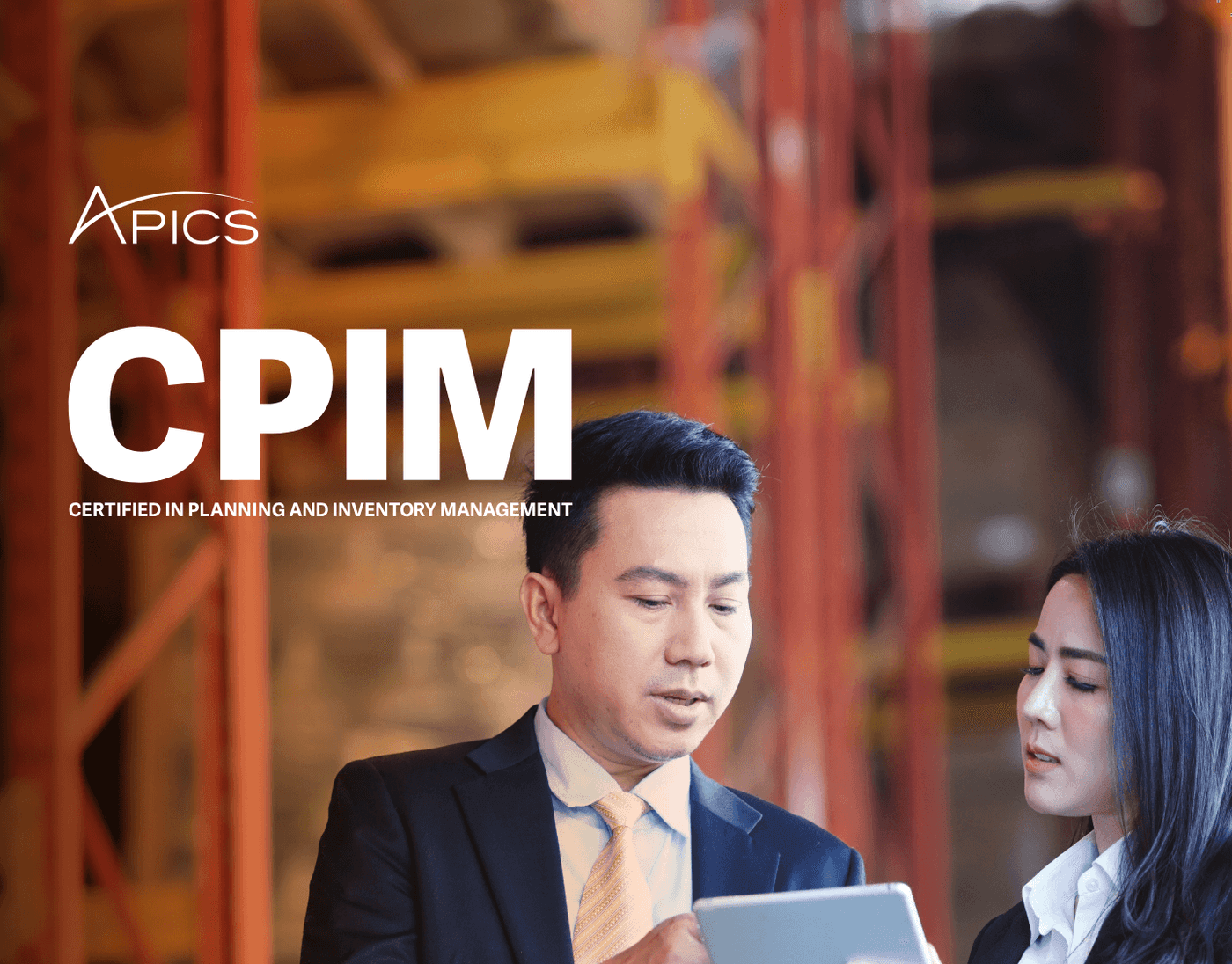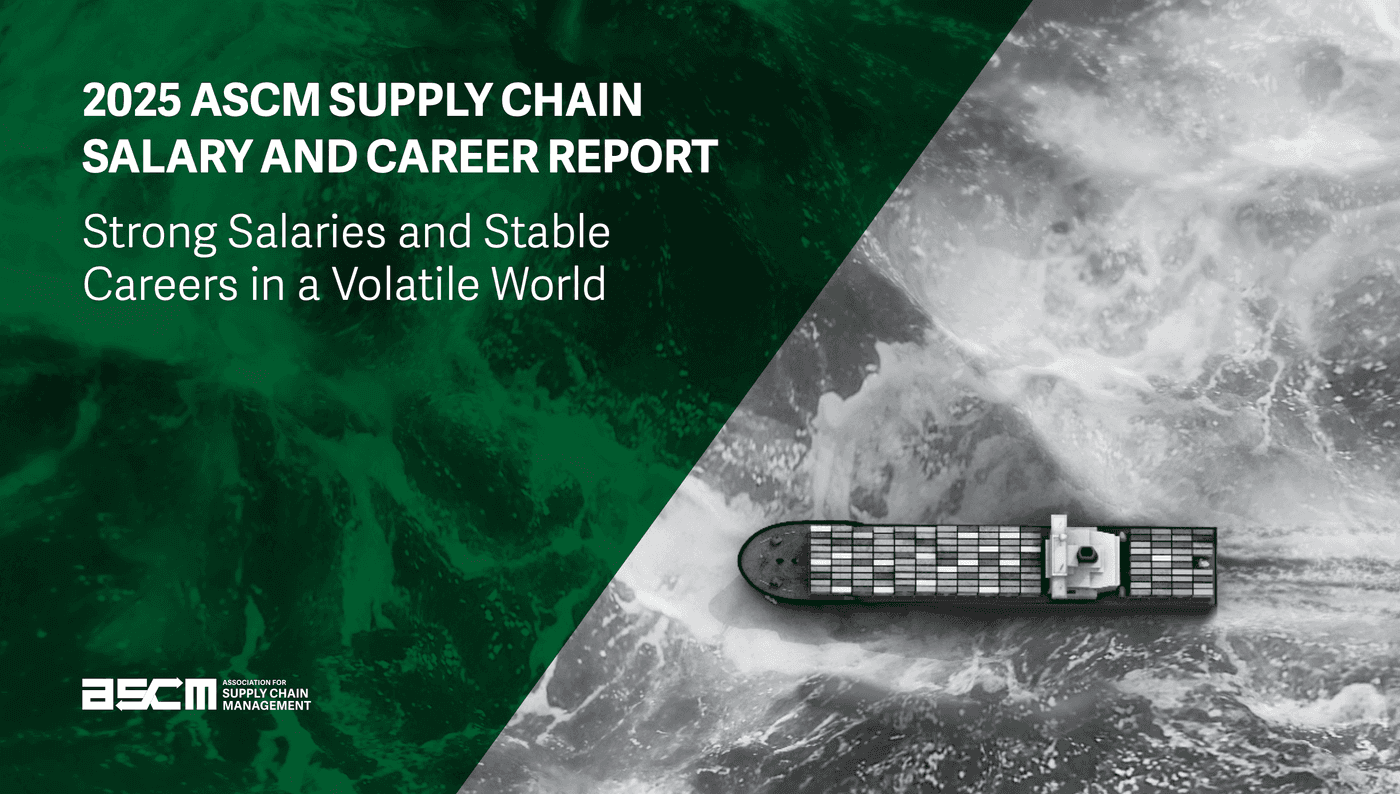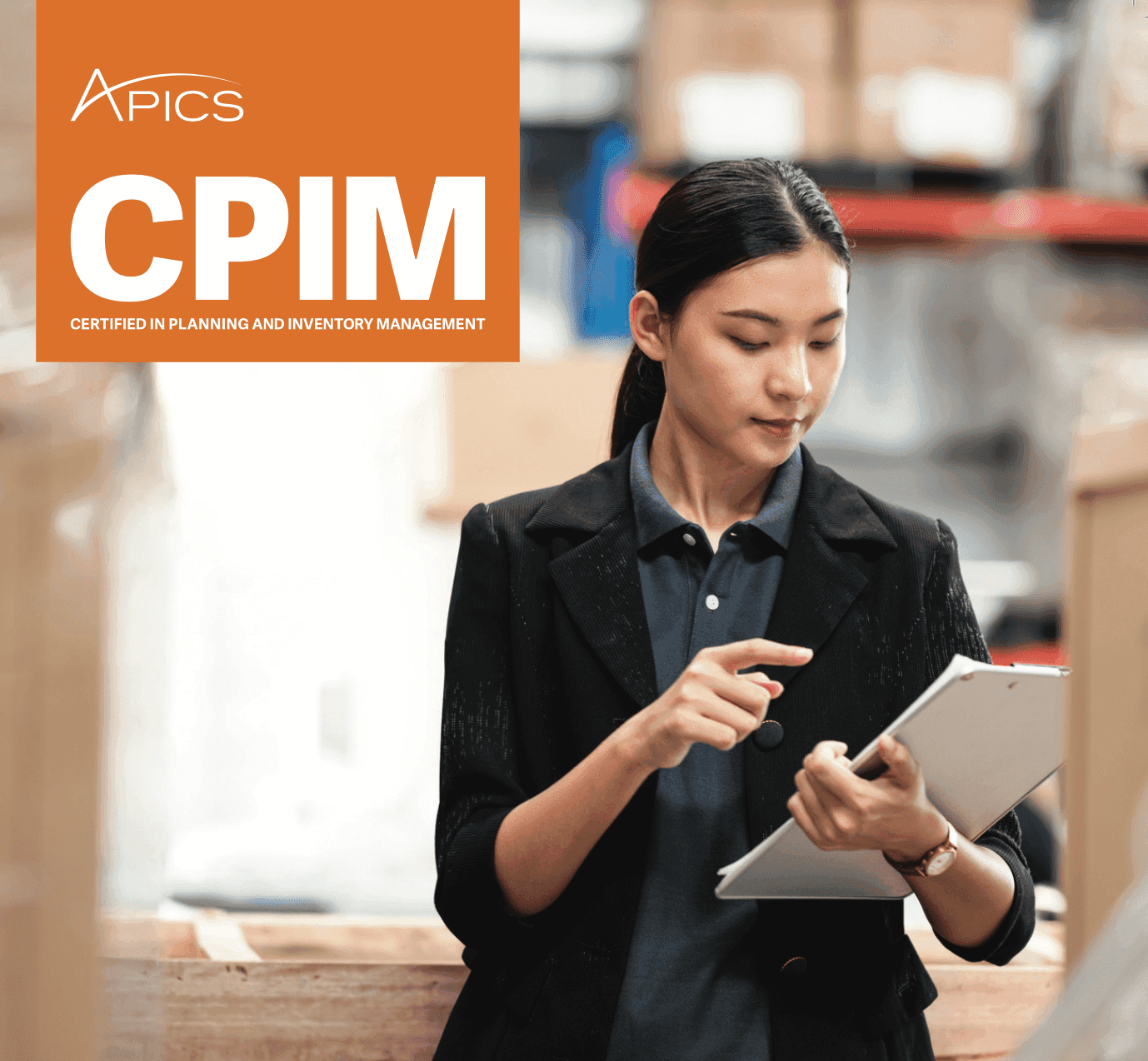Il Master si articola in 7 giornate formative suddivise 5 giornate di aula e 4 sessioni Live Webinar. Segue il programma dettagliato.
Master APICS CPIM - Certified in Planning & Inventory Management
Testimonianze
Vedi tutti >

DURATA
5 giornate in aula +
4 sessioni Live Webinar
in 6 mesi

PROSSIMI CORSI
26 Marzo 2026 Milano
19 Marzo 2026 Bologna
16 Marzo 2026 Latina

PREZZO
4290 Euro + IVA
L’Executive Master è finalizzato a preparare il candidato alla certificazione internazionale Certified in Planning & Inventory Management (CPIM) di APICS che, dal 2023, prevede il superamento di un unico esame, che unisce i precedenti CPIM Part 1 e CPIM Part 2.
Al termine del corso, il partecipante potrà sostenere l’esame APICS e conseguire la prestigiosa certificazione CPIM.
Il programma CPIM affronta in maniera completa ed esaustiva tutti gli strumenti rilevanti per la gestione operativa aziendale.
Il corso si basa sul Body of Knowledge (BOK) di APICS ed è finalizzato a:
-
Piano didattico
LEGGI I DETTAGLI ▾
STRUTTURA DEL MASTER
Il Master prevede:
- Una fase di formazione aula e in modalità live webinar
- Una fase di studio individuale con un supporto a distanza degli istruttori
- Simulazione dell’esame con discussione dei risultati
Una forte interattività, accompagnata da scambi di esperienze, consente ai partecipanti di arricchire le proprie conoscenze e di affrontare i problemi posti dalle loro aziende.
La docenza è in italiano, mentre il materiale didattico e l’esame finale sono in inglese. È pertanto richiesta una buona conoscenza della lingua inglese.
Per ottenere la certificazione, dal 2023 è necessario il superamento di un unico esame, che unisce i precedenti CPIM Part 1 e CPIM Part 2.
PROGRAMMA DETTAGLIATO
Modulo 1- Supply Chains and Strategy
- Supply Chains, the Environment, and Strategy
- Strategic Scope and Objectives
- Developing and Managing Organizational Strategy
- Functional and Operational Strategies
- Environments, Types, and Layouts
- Performance Monitoring and KPIs
- Risk Management
- Capital Equipment and Facilities
- Sustainability Strategies
Modulo 2 - Sales and Operations Planning
- S&OP Purpose and Process
- Aggregate Demand and Supply Plans
- Reconciling S&OP Plans
Modulo 3 - Demand
- Demand Management
- Sources of Demand/Forecasting
- Forecast Performance
Modulo 4 - Supply
- Creating and Validating the Master Schedule
- Using and Maintaining the Master Schedule
- Material Requirements Planning
- CRP and Scheduling
- Suppliers and Purchasing
- Changes and Product Life Cycle Management
Modulo 5 - Detailed Schedules
- Planning Detailed Schedules
- Scheduling and PAC Methods
- Creating Production and Service Schedules
- Managing Detailed Schedules and Scheduling Materials
Modulo 6 - Inventory
- Inventory Planning
- Inventory and Product Costs, Value, and Metrics
- Itemized Inventory Management
- Inventory Control
Modulo 7 - Distribution
- Planning Distribution
- Replenishment and Order Management
- Waste Hierarchy and Reverse Logistics
Modulo 8 - Quality, Technology, and Continuous Improvement
- Quality
- Technology
- Continuous Improvement
Modulo Aggiuntivo per corsi in house: Serious Game (1 giornata)
Questo modulo applicativo delle conoscenze acquisite, insieme ad un istruttore qualificato APICS, fa parte del programma Train for Per4mance di Advance School. Nel corso di tale modulo, si esaminano le scelte tattiche e strategiche da applicare nella Supply Chain per migliorare il P&L di un'azienda.
Per altre info sul modulo, leggere il Success Story Advance - Case New Holland: Train for Per4mance.
-
A chi si rivolge
Il corso si rivolge alla seguenti figure professionali:
LEGGI I DETTAGLI ▾
- • Responsabili di Logistica e risorse in staff alla funzione
- • Consulenti di Direzione
- • Responsabili di Produzione e risorse in staff alla funzione
- • Direttori di Stabilimento
- • Responsabili Acquisti
- • Personale di nuova assunzione da inserire rapidamente in azienda nell’area Logistica o Produzione
- • Personale coinvolto nell’implementazione o nell’utilizzo di sistemi ERP
-
ESAMI
LEGGI I DETTAGLI ▾
Al fine di ottenere la certificazione CPIM - Certified in Planning and Inventory Management - è previsto un unico esame finale Computer based (CBT) sostenibile presso i Test Center PearsonVue presenti su tutto il territorio nazionale.
Per quanto riguarda la data dell’esame, non ci sono date prestabilite: è possibile sostenere l'esame quando si preferisce in base alla disponibilità del Test Centre, entro 12 mesi dall'attivazione del corso.
L’esame consiste in 150 domande a risposta multipla nell'arco di 3.5 ore in lingua inglese.
L'elenco completo dei Test Centre PearsonVue è disponibile al link: https://home.pearsonvue.com/apics e sulla voce "Find a test centre" sulla destra.
-
Costi e iscrizione
Come sotto riportato, le quote di partecipazione variano a seconda di quando si sottoscrive l'iscrizione. Affrettatevi per non perdere i vantaggi offerti dalla scuola!
LEGGI I DETTAGLI ▾
QUOTA DI PARTECIPAZIONE
4290 Euro + IVA.
Nota Bene:
Sono previste agevolazioni per iscrizioni early bird.
La quota comprende il materiale didattico ufficiale APICS ma non comprende l’iscrizione all’esame.
Contattaci per avere l'offerta comprensiva di esame e 2nd Chance exam, a info@advanceschool.org
Il corso prevede un numero minimo di 6 partecipanti per l'attivazione. I posti sono limitati al fine di consentire una interazione ottimale tra partecipanti ed istruttori.
Per l’iscrizione occorre inviare via mail (info@advanceschool.org) la scheda di iscrizione compilata insieme alla ricevuta dell’avvenuto bonifico o a un ordine d’acquisto.
La scheda può essere scaricata dal link: Scheda registrazione
News collegate
-

Perchè scegliere la Certificazione CPIM
Non perdere l'occasione per distinguerti in ambito Operations e Supply Chain Management, accresci le tue competenze con il programma Apics CPIM - Certified in Planning and Inventory Management. » -

10/07/2024
Il Mercato del Lavoro cerca le Certificazioni APICS
In un mondo del lavoro in continua evoluzione, la domanda per professionisti qualificati nella Supply Chain e nelle Operations sta crescendo a un ritmo senza precedenti! La certificazione APICS è ormai diventato uno standard internazionale di competenza. » -

11/05/2024
Il Report ASCM Supply Chain Salary 2024 conferma che la certificazione APICS è un vantaggio competitivo sul mercato del lavoro
Le certificazioni APICS/ASCM aumentano il potenziale di guadagno e offrono competenze avanzate riconosciute a livello internazionale, migliorando carriera e soddisfazione professionale nel settore della supply chain. » -

09/07/2024
Enhancing Supply Chain Transparency through Blockchain Technology
Nel nostro nuovo articolo, scopri come la tecnologia blockchain rivoluziona la trasparenza e la tracciabilità della supply chain, migliorando l'efficienza e la fiducia dei consumatori. » -

16/09/2024
Nuovi corsi CPIM in partenza a Ottobre e Novembre 2024
Iscriviti ora ai corsi in aula o in modalità webinar: contattaci per conoscere le agevolazioni! » -

12/01/2025
Harnessing Generative AI to Strengthen Supply Chain Resilience through Strategic Customer and Supplier Relationships
Scopri come AI ottimizza le relazioni con i fornitori, mitiga i rischi e aumenta l'efficienza operativa in un'era di crescente complessità. » -

25/01/2025
Accelera la tua carriera con la certificazione CPIM!
Non perdere l'occasione per distinguerti in ambito Operations e Supply Chain Management, accresci le tue competenze con il programma APICS CPIM - Certified in Planning and Inventory Management. » -

27/02/2025
Superare il Data Overload per una Maggiore Visibilità e un migliore Processo Decisionale nella Supply Chain
L'overload informativo è una sfida crescente nella gestione della supply chain. Sebbene la condivisione dei dati migliori la visibilità e il processo decisionale, un eccesso di informazioni può ostacolare l’efficienza operativa. » -

26/04/2025
Protezionismo nell’UE e Localizzazione della Supply Chain: Analisi del passaggio da Reti Globali a Regionali
L'Unione Europea si sta orientando verso il protezionismo e la localizzazione delle catene di approvvigionamento, spinta dalle tensioni geopolitiche e dalle crisi globali. Questa scelta strategica mira a rafforzare la resilienza, ma comporta il rischio di costi più elevati, minore competitività e una possibile frammentazione del commercio globale. » -

14/08/2025
Corsi CPIM autunno 2025: competenze state-of-the-art in Planning & Inventory Management e riconoscimento internazionale
Partecipa ai corsi CPIM di Advance School con inizio nei mesi di Ottobre e Novembre 2025. Ottieni la certificazione internazionale in pianificazione e Inventory Management, migliora la tua carriera e approfitta dei vantaggi Early Registration. Modalità in aula e online, docenti esperti e contenuti ufficiali ASCM. » -

13/08/2025
Il Report ASCM Supply Chain Salary 2025 conferma che la certificazione APICS accelera la carriera!
Il 2025 ASCM Supply Chain Salary and Career Report evidenzia come la Supply Chain offra alti salari, stabilità e soddisfazione professionale. I certificati APICS, come il CSCP, ottengono in media il 20% in più rispetto ai colleghi non certificati, con migliori prospettive globali. In un settore in rapida evoluzione, la certificazione APICS rappresenta un investimento strategico per accrescere competenze, guadagno e opportunità di leadership. » -

21/08/2025
Il mercato del lavoro ricerca professionisti con certificazione APICS
La domanda per professionisti qualificati e certificati APICS nella Supply Chain e nelle Operations è cresciuta del 40% rispetto al 2024. La certificazione APICS si conferma uno standard internazionale di competenza. » -

17/10/2025
The Rise of the ‘Invisible Customer’ in EU E-Commerce: Rethinking Customer Relationship Strategies Amidst Regulatory Pressures
Discover how EU e-commerce is evolving under growing regulatory pressures » -

08/12/2025
Come gli obiettivi di sostenibilità condivisi stanno ridefinendo le collaborazioni nelle Supply Chain dell'UE.
Scopri la crescente importanze della sostenibilità collaborativa per le moderne supply chain. » -

05/01/2026
In partenza a febbraio e marzo 2026 le nuove edizioni CPIM!
Acquisisci competenze di livello internazionale con la certificazione APICS Certified in Planning and Inventory Management. »








